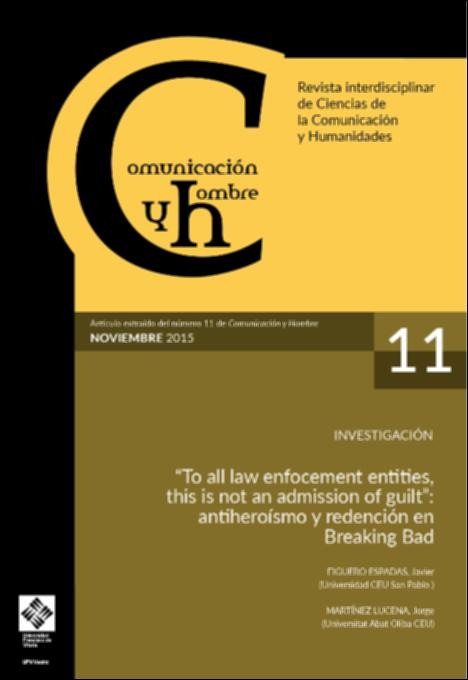Please use this identifier to cite or link to this item:
http://hdl.handle.net/10637/16096“To all law enforcement entities, this is not an admission of guilt”: antiheroísmo y redención en Breaking Bad
| Title: | “To all law enforcement entities, this is not an admission of guilt”: antiheroísmo y redención en Breaking Bad |
| Authors : | Figuero Espadas, Javier Martínez Lucena, Jorge |
| Keywords: | Breaking Bad; Vince Gilligan; Script; Visual aesthetics; Antihéroe; Redención; Guión; Estética visual |
| Publisher: | Universidad Francisco de Vitoria |
| Citation: | Javier Figuero Espadas; Jorge Martínez Lucena. “To all law enforcement entities, this is not an admission of guilt”: antiheroísmo y redención en Breaking Bad. Comunicación y hombre. 1 - 11, pp. 69 - 81. 2015 |
| Abstract: | Walter White, alias “Heisenberg”, is the protagonist of Breaking Bad (2008-2013). As every antihero, he is double-sided: self-centered and familiar, criminal and fatherly, smart and ruthless, morally ambiguous although strangely attractive to the contemporary viewer. This article aims to study this figure from an hermeneutical point of view. We analyze and interpret the script of the pilot (1.1) and the last episode (5.16) in order to determine whether there are traces of anti-heroism and redemption in this character strictly linked to narrative elements, such as the description of the character, the physical and social context, dialogues and visual resources. Walter White, alias Heisenberg, es el protagonista de Breaking Bad. Como todos los antihéroes, es bifronte: egocéntrico y familiar, paternal y criminal, inteligente y despiadado, aunque curiosamente atractivo para el espectador. El presente artículo quiere estudiar la figura del antihéroe y su redención desde un punto de vista teórico. Para ello, analizaremos la presentación y despedida de Walter White en el guion de Breaking Bad, para dilucidar si existen trazos de redención del personaje ligados estrictamente a elementos narrativos del relato, como la descripción en el guion, el contexto físico y social, los diálogos y la estética visual. |
| URI: | http://hdl.handle.net/10637/16096 |
| Rights : | http://creativecommons.org/licenses/by-nc-nd/4.0/deed.es |
| ISSN: | 1885-365X |
| Issue Date: | 13-Apr-2015 |
| Center : | Universidad San Pablo-CEU |
| Appears in Collections: | Facultad de Humanidades y CC de la Comunicación |
Items in DSpace are protected by copyright, with all rights reserved, unless otherwise indicated.


